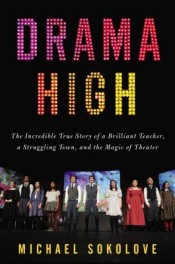You may remember earlier this month when I posted about a book blogger survey that Shannon (River City Reading), Jennifer (Literate Housewife) and I put together. The results have been in for a couple of weeks, but it’s taken us awhile to dig into them.
Yesterday, Shannon put up our first post on the results, looking at the overall picture of the 310 book bloggers who responded. If you don’t have time to read her very well-done post, here are some quick snapshots about the bloggers who took our survey:
- 61 percent have been blogging for less than four years, about 33 percent have been blogging for four years or longer, and 5 percent were no longer blogging
- 40 percent of bloggers post two or three times per week. About 30 percent post once a week (or less), while the other 30 percent post four or more times per week.
- Very few book bloggers who took the survey have ads on their site or use affiliate links.
- Most book bloggers who are paid to write about books on sites other than their personal blogs have been blogging for more than two years.
In this post, I’m going to look at some of the questions that get at attitudes book bloggers have about book blogging and some of the pressures that impact bloggers.
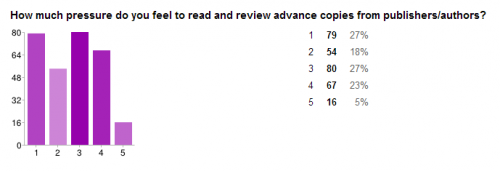
One sentiment that seems to be common among book bloggers is that the pressure to read and review books can sometimes take the fun out of book blogging. But when we asked bloggers how much pressure they felt to read and review books from publishers/authors — 1 being no pressure, 5 being a lot of pressure — most fell in the middle. Only 5 percent said they felt a lot of pressure, while 27 percent said they felt no pressure at all. When I looked at the age range for bloggers who said they felt a lot of pressure, it was evenly split between younger blogger (less than four years) and older bloggers (up to seven years).
Part of me wonders if we phrased this question badly. It might have been more revealing to ask whether bloggers felt a personal or internal pressure to read and review certain books, rather than focusing on whether that pressure came from people in the publishing industry (which, now that I look at it again, the question seems to imply).
Next, we asked about life changes that may impact an individual’s ability to continue blogging or may impact their interest in maintaining a site.
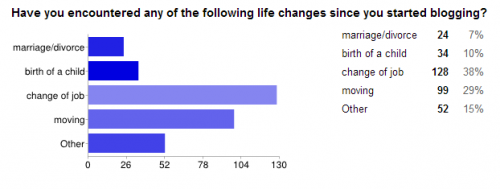

For this question, we let respondents chose multiple options, so you can see there are significantly more answers here. However, based on the number of people who chose “Not Applicable” for the second question (33 percent) and my own digging, it appears only about two-thirds of the people surveyed said they’d had significant life event during the time they’d been blogging.
Of the people who said that they seriously considered abandoning their blog, many mentioned a change of job or other significant issues (illnesses, death in the family, changes to family structure) happening during their time blogging. I think even without looking at the results, it’s clear that sometimes our lives get in the way of blogging to a point where some of us (about 26 percent) consider finding a new hobby. Later this week, Jennifer will be looking at the responses from people who are former book bloggers, which may add some context to these results.
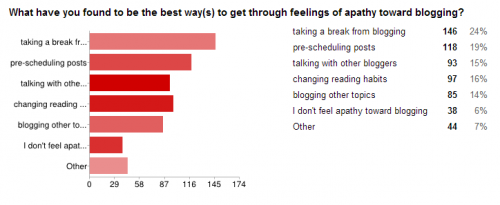
Finally, we asked about some of the strategies that blogger’s employ to help get over feelings of apathy towards blogging. I am amazed by the 7 percent of bloggers who said they don’t feel apathy when blogging. About half of those people were young bloggers (less than four years), but the rest were a mix of ages. Good for you guys! A good chunk of bloggers (24 percent) also just take a break from blogging, which I think is a good strategy too. Here are some other strategies bloggers mentioned:
- Asking for guest posts; keeps content flowing without me needing to write as much.
- Writing fewer posts but spending more time on each post. Only posting writing that I am proud of.
- Giving up or taking a break from social media extras or blogging-related projects that take my focus from reading and writing.
- Getting away from ARCs.
- I still blog, but devote less time to it, and don’t promote my posts. Oddly, my traffic usually picks up, which re-energizes me.
- Working through it, allowing myself to write/blog slightly sub-standard content to get out of my funk.
- Usually just need to find something new to feel excited about – new book, author conversation.
I’m also planning to look at two the open-ended questions (“How as blogging impacted your reading?” and “At what point (time or event) did you feel established as a book blogger?”), but this post is getting a little bit long. I’ll back with those answers sometime later in the week.

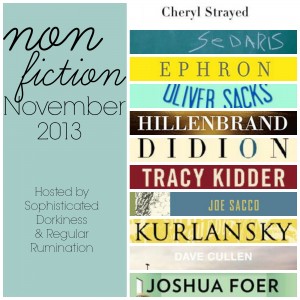 What is more fun than a book blogging event that includes nonfiction and alliteration? Nothing!
What is more fun than a book blogging event that includes nonfiction and alliteration? Nothing!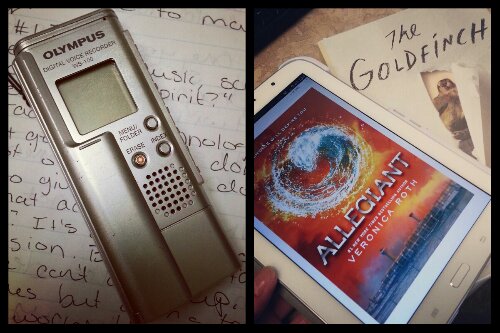
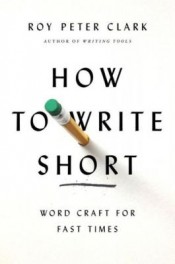 Title:
Title: 


